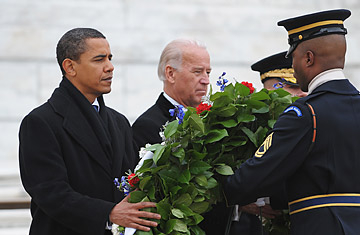
Barack Obama and Joe Biden lay a wreath at the Tomb of the Unknown Soldier in Arlington, Va., on Jan. 18
Amid all the pomp and solemnity surrounding his arrival in Washington, Barack Obama found time to perform a couple of quiet salutes to an important constituency. On Sunday morning, he and Vice President–elect Joe Biden placed a wreath at the Tomb of the Unknown Soldier in Arlington National Cemetery. On Monday morning, the President-elect slipped over to Walter Reed Army Medical Center for an unannounced visit with troops wounded in Afghanistan and Iraq. Much of the country may have missed those brief visits, but the men and women of the U.S. military didn't.
The occasions themselves were muted. Obama said nothing publicly at Arlington, and cameras were barred during his Walter Reed visit. But the symbolism is more important than anything Obama could have said. He's gone out of his way to win the hearts and minds — if not the votes — of those wearing the uniforms of the nation's armed services. (See pictures of Obama taken or illustrated by everyday Americans.)
Military officers — especially those who tend to talk privately to reporters, knowing that their views will seep into news coverage — say Obama wins points for the national-security team he has tapped. His National Security Adviser will be retired Marine General James Jones, who thereby becomes the new President's closest foreign policy aide. Jones is held in high regard inside the Pentagon for his stewardship of the corps as its commandant and for his final uniformed posting as NATO's military chief. Obama's top intelligence pick is retired Navy Admiral Dennis Blair, widely regarded as whip-smart. He'll serve as Director of National Intelligence, overseeing the nation's sprawling spy bureaucracy. Obama is also keeping on Bush's Defense Secretary, Robert Gates. Even his pick for Secretary of State — former First Lady and New York Senator Hillary Clinton — has won both public and private plaudits from the military following her astute work on the Armed Services Committee since 2003. (See who's who in Obama's White House.)
The incoming First Lady, Michelle Obama, is also doing her part in wooing the armed forces. She has already made clear that she wants to adopt military families as her special concern. Perhaps that's why the so-called Kids' Inaugural on Monday night, featuring the Jonas Brothers, is being billed as a concert to honor military families. One of the 10 official balls the new President will attend on Tuesday night is the Commander in Chief's Ball (first held by George W. Bush); the largely enlisted crowd will get to attend free of charge in the National Building Museum in downtown D.C. As anyone who has ever served in uniform knows, that's a surefire way to win the grunts' support. (See pictures of the fashion of Michelle Obama.)
Earning the military's trust is an obligation that comes when assuming command in the middle of two wars (a nonscientific poll before the election by the independent Army Times newspaper showed GOP nominee John McCain getting three military votes for every one for Obama). But it's also an acknowledgment that while the military's enthusiasm for a new President won't win either wars or votes, a rocky relationship between the President and the military forces under his command can undermine his presidency.
To some degree, that's what happened the last time a Democratic President took over. Back in 1993, Bill Clinton — who had said he ended up "loathing the military" while successfully avoiding the draft during the Vietnam War — generated substantial ire among the ranks. Smoldering resentments exploded into anger with his quick unilateral push to let gays serve in uniform. The scars persisted throughout his eight years in office. While Obama has pledged to do the same, he's benefiting from a shift in the national mood on the topic and from his gentle approach, pledging to seek advice from the military before seeking change.
On the combat front, there has been surprisingly little opposition voiced in military circles to Obama's pledge to withdraw about half the 142,000 U.S. troops in Iraq within 16 months. In part, that's because Obama has said he will listen to commanders if they begin to feel the withdrawal is jeopardizing the uneasy peace there. But he has also benefited from the recently signed deal between Iraq and the Bush Administration calling for removal of virtually all U.S. troops from the country within three years.
And so, as far as the courtship is going, Obama is getting a solid salute back from the rank and file.
